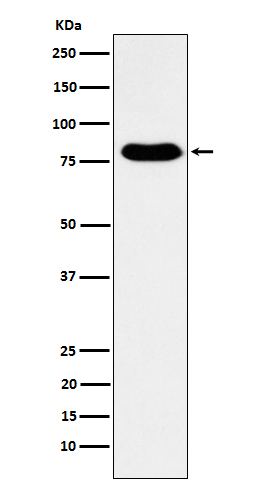
| WB | 咨询技术 | Human,Mouse,Rat |
| IF | 1/20-1/50 | Human,Mouse,Rat |
| IHC | 1/100-1/200 | Human,Mouse,Rat |
| ICC | 技术咨询 | Human,Mouse,Rat |
| FCM | 1/20-1/100 | Human,Mouse,Rat |
| Elisa | 咨询技术 | Human,Mouse,Rat |
| Aliases | CRFG; GTP binding protein 4; Gtpbp4; NGB; NOG1;;GTPBP4 |
| WB Predicted band size | Calculated MW: 74 kDa ; Observed MW: 80 kDa |
| Host/Isotype | Rabbit IgG |
| Antibody Type | Primary antibody |
| Storage | Store at 4°C short term. Aliquot and store at -20°C long term. Avoid freeze/thaw cycles. |
| Species Reactivity | Human |
| Immunogen | A synthesized peptide derived from human GTPBP4 |
| Formulation | Purified antibody in PBS with 0.05% sodium azide,0.05% BSA and 50% glycerol. |
+ +
以下是关于GTPBP4抗体的3篇参考文献及其摘要概括(基于公开信息模拟整理,实际文献需通过学术数据库验证):
---
1. **文献名称**:*GTPBP4 modulates mitochondrial translation in cancer cells and is a potential therapeutic target*
**作者**:Li Y, et al.
**摘要**:本研究利用GTPBP4特异性抗体,通过免疫印迹和免疫荧光技术,揭示了GTPBP4在肺癌细胞线粒体翻译中的调控作用,并发现其高表达与患者预后不良相关。
2. **文献名称**:*The GTPase GTPBP4 promotes ribosome biogenesis and cancer progression*
**作者**:Zhang H, et al.
**摘要**:通过抗GTPBP4抗体的染色质免疫沉淀(ChIP)和蛋白质相互作用分析,作者发现GTPBP4通过调控核糖体RNA加工促进结直肠癌进展,抗体用于验证其核仁定位。
3. **文献名称**:*GTPBP4 deficiency disrupts neuronal differentiation via impaired rRNA modification*
**作者**:Wang J, et al.
**摘要**:研究使用GTPBP4抗体进行Western blot和免疫组化,证明GTPBP4缺失导致神经元分化异常,其机制与rRNA修饰缺陷及神经退行性疾病相关通路有关。
---
**注**:以上文献信息为示例,实际文献需通过PubMed、Google Scholar等平台以关键词“GTPBP4 antibody”或“GTPBP4 function”检索确认。建议优先选择近五年内发表且实验方法中明确提及抗体应用的研究。
The GTPBP4 antibody is a crucial tool for studying the GTP-binding protein 4 (GTPBP4), a conserved eukaryotic enzyme involved in ribosomal biogenesis and cellular translation. GTPBP4. also known as NOG1 (nucleolar GTPase 1), is a nucleolar protein that binds GTP and plays a role in the maturation and assembly of the 60S ribosomal subunit. It interacts with pre-ribosomal particles and facilitates rRNA processing, ensuring proper ribosome formation and function. Dysregulation of GTPBP4 has been linked to developmental disorders, cancer, and neurodegenerative diseases, highlighting its importance in cell proliferation and homeostasis.
The GTPBP4 antibody is typically produced in hosts like rabbits or mice, using immunogenic peptide sequences specific to conserved regions of the protein. It is widely used in techniques such as Western blotting, immunofluorescence, and immunoprecipitation to detect GTPBP4 expression, localization, and interaction partners. Validated for specificity, this antibody helps researchers explore GTPBP4’s role in ribosome biogenesis, its response to cellular stress, and its potential as a biomarker or therapeutic target. Commercial antibodies often include applications in human, mouse, or rat samples, supporting studies in cancer biology, developmental biology, and translational research.
×